Privacy in the Age of Social Media: A Critical Analysis
VerifiedAdded on 2019/12/18
|10
|4051
|130
Essay
AI Summary
This essay examines the pervasive impact of social media on personal privacy in the 21st century. It highlights the increasing trend of users sharing sensitive information online, leading to potential misuse and risks like identity theft, cyberstalking, and data mining by social media giants. The essay discusses how platforms like Facebook and Twitter collect user data, often without explicit consent, for targeted advertising and customer service improvements, raising concerns about surveillance and the potential for misuse by government agencies. While social media companies introduce features like privacy settings, the essay critiques their effectiveness and the lack of user control over data sharing. The essay explores how companies and third parties monitor user activities, leading to privacy breaches and the theft of personal information. It concludes by emphasizing the need for users to be vigilant about their online activities and for social media companies to prioritize user privacy to maintain trust and customer base.
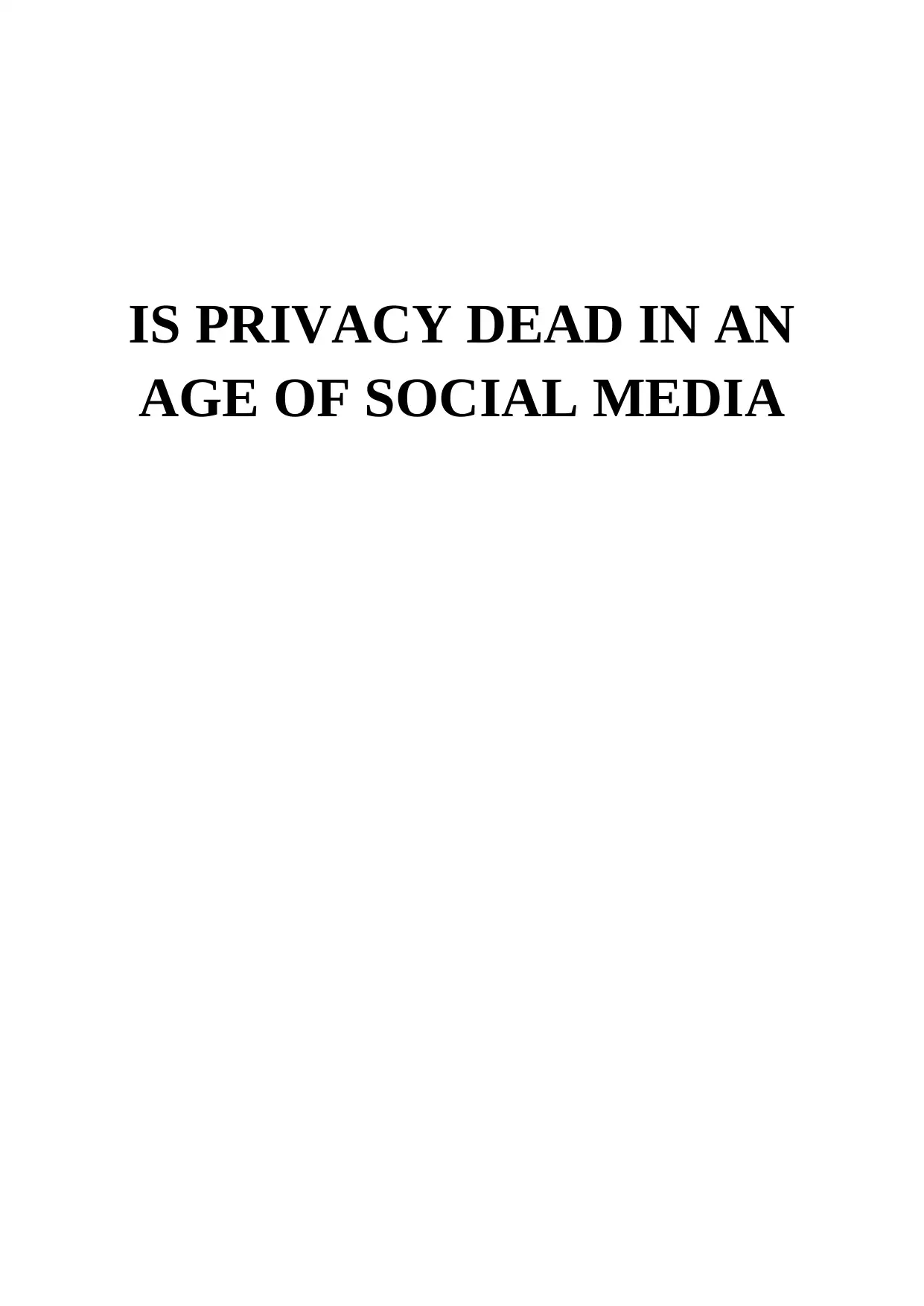
IS PRIVACY DEAD IN AN
AGE OF SOCIAL MEDIA
AGE OF SOCIAL MEDIA
Paraphrase This Document
Need a fresh take? Get an instant paraphrase of this document with our AI Paraphraser
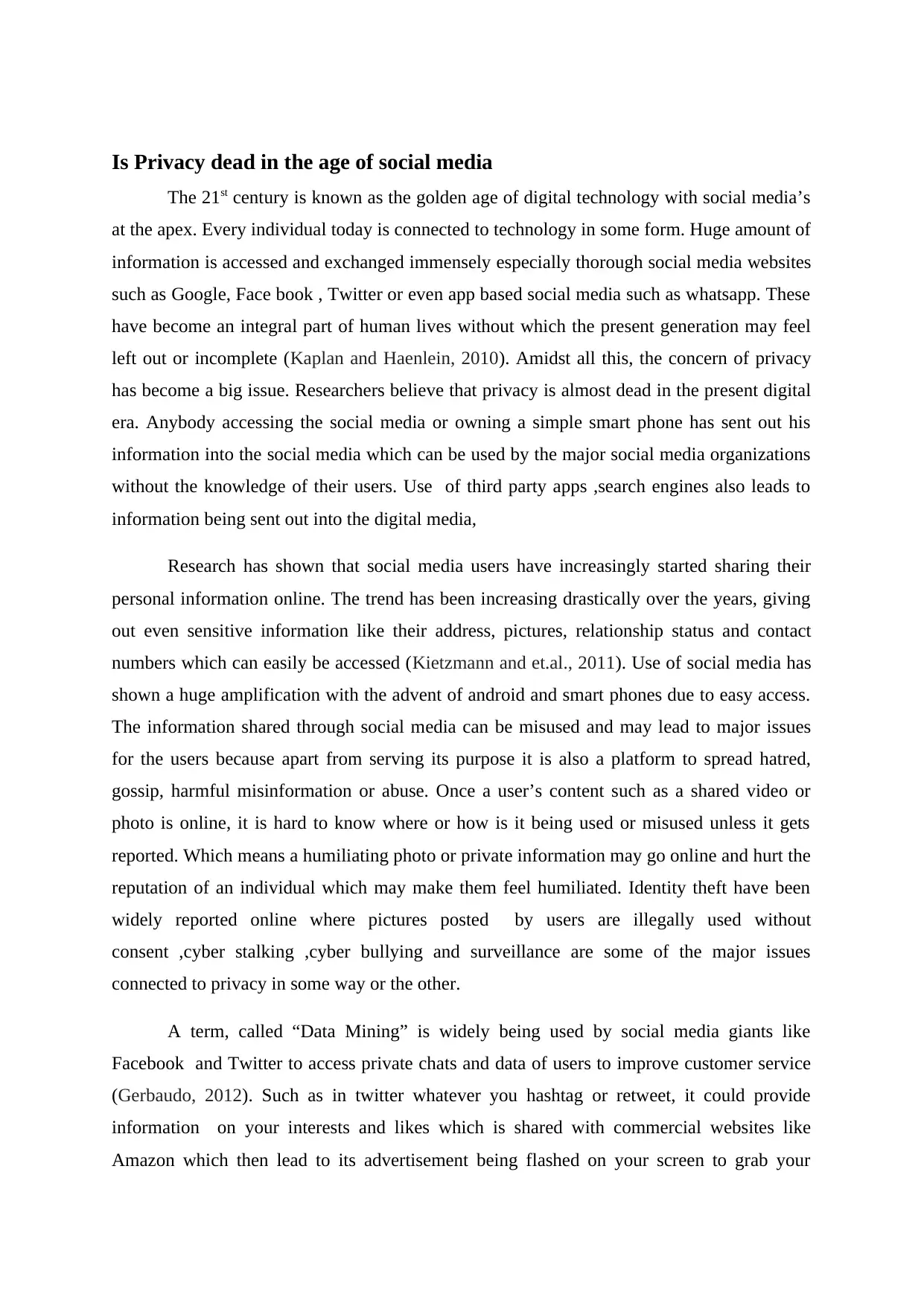
Is Privacy dead in the age of social media
The 21st century is known as the golden age of digital technology with social media’s
at the apex. Every individual today is connected to technology in some form. Huge amount of
information is accessed and exchanged immensely especially thorough social media websites
such as Google, Face book , Twitter or even app based social media such as whatsapp. These
have become an integral part of human lives without which the present generation may feel
left out or incomplete (Kaplan and Haenlein, 2010). Amidst all this, the concern of privacy
has become a big issue. Researchers believe that privacy is almost dead in the present digital
era. Anybody accessing the social media or owning a simple smart phone has sent out his
information into the social media which can be used by the major social media organizations
without the knowledge of their users. Use of third party apps ,search engines also leads to
information being sent out into the digital media,
Research has shown that social media users have increasingly started sharing their
personal information online. The trend has been increasing drastically over the years, giving
out even sensitive information like their address, pictures, relationship status and contact
numbers which can easily be accessed (Kietzmann and et.al., 2011). Use of social media has
shown a huge amplification with the advent of android and smart phones due to easy access.
The information shared through social media can be misused and may lead to major issues
for the users because apart from serving its purpose it is also a platform to spread hatred,
gossip, harmful misinformation or abuse. Once a user’s content such as a shared video or
photo is online, it is hard to know where or how is it being used or misused unless it gets
reported. Which means a humiliating photo or private information may go online and hurt the
reputation of an individual which may make them feel humiliated. Identity theft have been
widely reported online where pictures posted by users are illegally used without
consent ,cyber stalking ,cyber bullying and surveillance are some of the major issues
connected to privacy in some way or the other.
A term, called “Data Mining” is widely being used by social media giants like
Facebook and Twitter to access private chats and data of users to improve customer service
(Gerbaudo, 2012). Such as in twitter whatever you hashtag or retweet, it could provide
information on your interests and likes which is shared with commercial websites like
Amazon which then lead to its advertisement being flashed on your screen to grab your
The 21st century is known as the golden age of digital technology with social media’s
at the apex. Every individual today is connected to technology in some form. Huge amount of
information is accessed and exchanged immensely especially thorough social media websites
such as Google, Face book , Twitter or even app based social media such as whatsapp. These
have become an integral part of human lives without which the present generation may feel
left out or incomplete (Kaplan and Haenlein, 2010). Amidst all this, the concern of privacy
has become a big issue. Researchers believe that privacy is almost dead in the present digital
era. Anybody accessing the social media or owning a simple smart phone has sent out his
information into the social media which can be used by the major social media organizations
without the knowledge of their users. Use of third party apps ,search engines also leads to
information being sent out into the digital media,
Research has shown that social media users have increasingly started sharing their
personal information online. The trend has been increasing drastically over the years, giving
out even sensitive information like their address, pictures, relationship status and contact
numbers which can easily be accessed (Kietzmann and et.al., 2011). Use of social media has
shown a huge amplification with the advent of android and smart phones due to easy access.
The information shared through social media can be misused and may lead to major issues
for the users because apart from serving its purpose it is also a platform to spread hatred,
gossip, harmful misinformation or abuse. Once a user’s content such as a shared video or
photo is online, it is hard to know where or how is it being used or misused unless it gets
reported. Which means a humiliating photo or private information may go online and hurt the
reputation of an individual which may make them feel humiliated. Identity theft have been
widely reported online where pictures posted by users are illegally used without
consent ,cyber stalking ,cyber bullying and surveillance are some of the major issues
connected to privacy in some way or the other.
A term, called “Data Mining” is widely being used by social media giants like
Facebook and Twitter to access private chats and data of users to improve customer service
(Gerbaudo, 2012). Such as in twitter whatever you hashtag or retweet, it could provide
information on your interests and likes which is shared with commercial websites like
Amazon which then lead to its advertisement being flashed on your screen to grab your
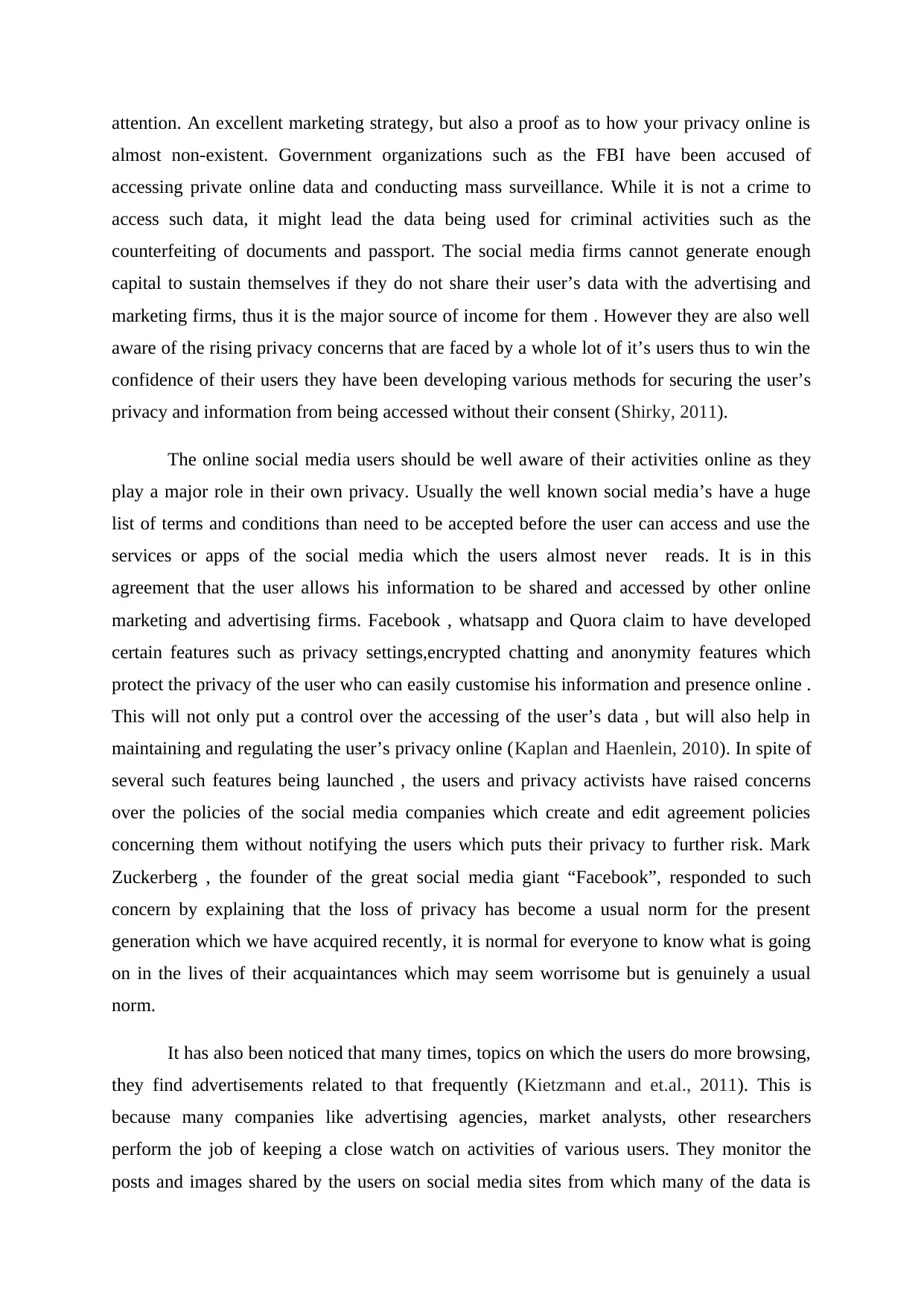
attention. An excellent marketing strategy, but also a proof as to how your privacy online is
almost non-existent. Government organizations such as the FBI have been accused of
accessing private online data and conducting mass surveillance. While it is not a crime to
access such data, it might lead the data being used for criminal activities such as the
counterfeiting of documents and passport. The social media firms cannot generate enough
capital to sustain themselves if they do not share their user’s data with the advertising and
marketing firms, thus it is the major source of income for them . However they are also well
aware of the rising privacy concerns that are faced by a whole lot of it’s users thus to win the
confidence of their users they have been developing various methods for securing the user’s
privacy and information from being accessed without their consent (Shirky, 2011).
The online social media users should be well aware of their activities online as they
play a major role in their own privacy. Usually the well known social media’s have a huge
list of terms and conditions than need to be accepted before the user can access and use the
services or apps of the social media which the users almost never reads. It is in this
agreement that the user allows his information to be shared and accessed by other online
marketing and advertising firms. Facebook , whatsapp and Quora claim to have developed
certain features such as privacy settings,encrypted chatting and anonymity features which
protect the privacy of the user who can easily customise his information and presence online .
This will not only put a control over the accessing of the user’s data , but will also help in
maintaining and regulating the user’s privacy online (Kaplan and Haenlein, 2010). In spite of
several such features being launched , the users and privacy activists have raised concerns
over the policies of the social media companies which create and edit agreement policies
concerning them without notifying the users which puts their privacy to further risk. Mark
Zuckerberg , the founder of the great social media giant “Facebook”, responded to such
concern by explaining that the loss of privacy has become a usual norm for the present
generation which we have acquired recently, it is normal for everyone to know what is going
on in the lives of their acquaintances which may seem worrisome but is genuinely a usual
norm.
It has also been noticed that many times, topics on which the users do more browsing,
they find advertisements related to that frequently (Kietzmann and et.al., 2011). This is
because many companies like advertising agencies, market analysts, other researchers
perform the job of keeping a close watch on activities of various users. They monitor the
posts and images shared by the users on social media sites from which many of the data is
almost non-existent. Government organizations such as the FBI have been accused of
accessing private online data and conducting mass surveillance. While it is not a crime to
access such data, it might lead the data being used for criminal activities such as the
counterfeiting of documents and passport. The social media firms cannot generate enough
capital to sustain themselves if they do not share their user’s data with the advertising and
marketing firms, thus it is the major source of income for them . However they are also well
aware of the rising privacy concerns that are faced by a whole lot of it’s users thus to win the
confidence of their users they have been developing various methods for securing the user’s
privacy and information from being accessed without their consent (Shirky, 2011).
The online social media users should be well aware of their activities online as they
play a major role in their own privacy. Usually the well known social media’s have a huge
list of terms and conditions than need to be accepted before the user can access and use the
services or apps of the social media which the users almost never reads. It is in this
agreement that the user allows his information to be shared and accessed by other online
marketing and advertising firms. Facebook , whatsapp and Quora claim to have developed
certain features such as privacy settings,encrypted chatting and anonymity features which
protect the privacy of the user who can easily customise his information and presence online .
This will not only put a control over the accessing of the user’s data , but will also help in
maintaining and regulating the user’s privacy online (Kaplan and Haenlein, 2010). In spite of
several such features being launched , the users and privacy activists have raised concerns
over the policies of the social media companies which create and edit agreement policies
concerning them without notifying the users which puts their privacy to further risk. Mark
Zuckerberg , the founder of the great social media giant “Facebook”, responded to such
concern by explaining that the loss of privacy has become a usual norm for the present
generation which we have acquired recently, it is normal for everyone to know what is going
on in the lives of their acquaintances which may seem worrisome but is genuinely a usual
norm.
It has also been noticed that many times, topics on which the users do more browsing,
they find advertisements related to that frequently (Kietzmann and et.al., 2011). This is
because many companies like advertising agencies, market analysts, other researchers
perform the job of keeping a close watch on activities of various users. They monitor the
posts and images shared by the users on social media sites from which many of the data is
⊘ This is a preview!⊘
Do you want full access?
Subscribe today to unlock all pages.

Trusted by 1+ million students worldwide
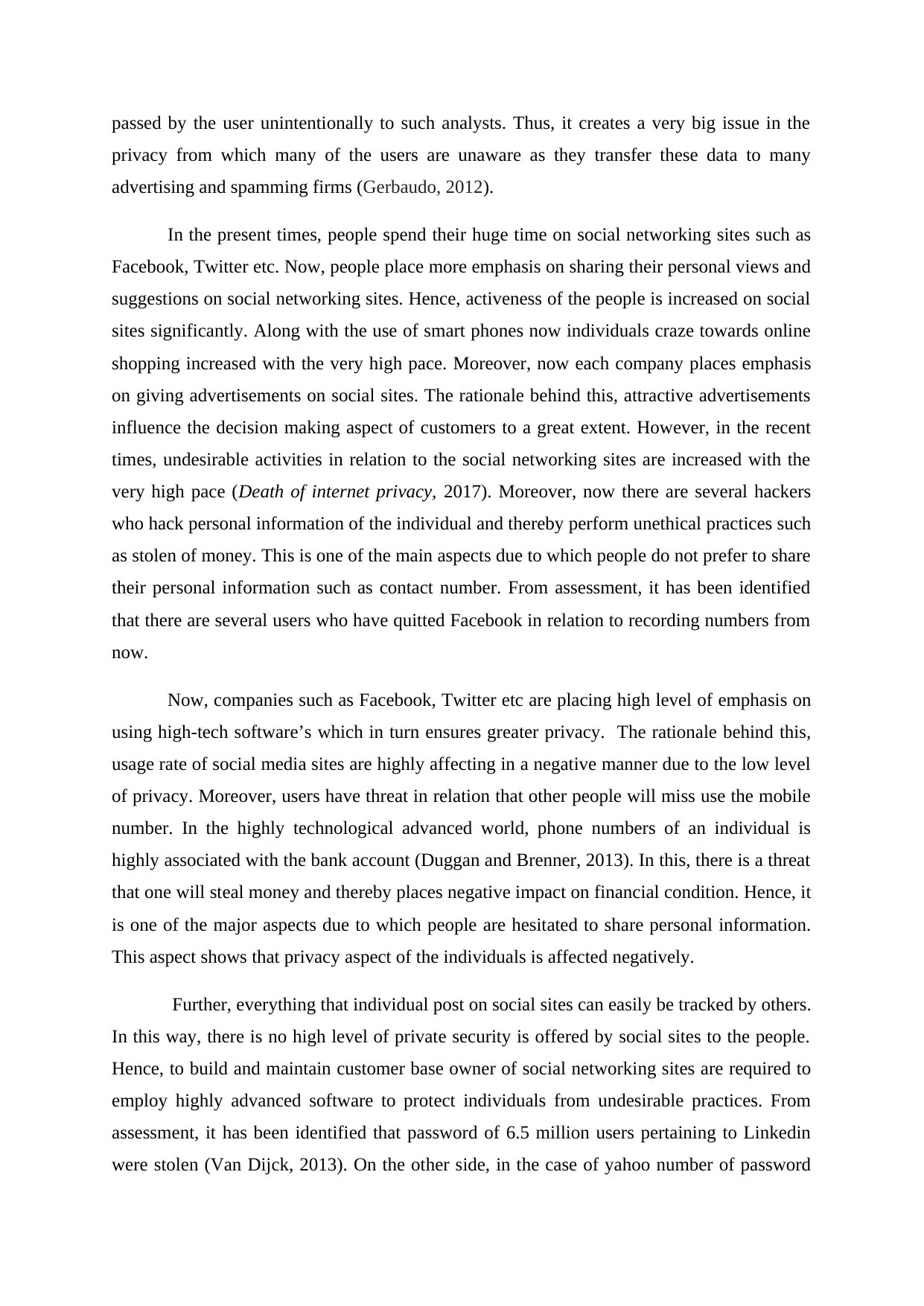
passed by the user unintentionally to such analysts. Thus, it creates a very big issue in the
privacy from which many of the users are unaware as they transfer these data to many
advertising and spamming firms (Gerbaudo, 2012).
In the present times, people spend their huge time on social networking sites such as
Facebook, Twitter etc. Now, people place more emphasis on sharing their personal views and
suggestions on social networking sites. Hence, activeness of the people is increased on social
sites significantly. Along with the use of smart phones now individuals craze towards online
shopping increased with the very high pace. Moreover, now each company places emphasis
on giving advertisements on social sites. The rationale behind this, attractive advertisements
influence the decision making aspect of customers to a great extent. However, in the recent
times, undesirable activities in relation to the social networking sites are increased with the
very high pace (Death of internet privacy, 2017). Moreover, now there are several hackers
who hack personal information of the individual and thereby perform unethical practices such
as stolen of money. This is one of the main aspects due to which people do not prefer to share
their personal information such as contact number. From assessment, it has been identified
that there are several users who have quitted Facebook in relation to recording numbers from
now.
Now, companies such as Facebook, Twitter etc are placing high level of emphasis on
using high-tech software’s which in turn ensures greater privacy. The rationale behind this,
usage rate of social media sites are highly affecting in a negative manner due to the low level
of privacy. Moreover, users have threat in relation that other people will miss use the mobile
number. In the highly technological advanced world, phone numbers of an individual is
highly associated with the bank account (Duggan and Brenner, 2013). In this, there is a threat
that one will steal money and thereby places negative impact on financial condition. Hence, it
is one of the major aspects due to which people are hesitated to share personal information.
This aspect shows that privacy aspect of the individuals is affected negatively.
Further, everything that individual post on social sites can easily be tracked by others.
In this way, there is no high level of private security is offered by social sites to the people.
Hence, to build and maintain customer base owner of social networking sites are required to
employ highly advanced software to protect individuals from undesirable practices. From
assessment, it has been identified that password of 6.5 million users pertaining to Linkedin
were stolen (Van Dijck, 2013). On the other side, in the case of yahoo number of password
privacy from which many of the users are unaware as they transfer these data to many
advertising and spamming firms (Gerbaudo, 2012).
In the present times, people spend their huge time on social networking sites such as
Facebook, Twitter etc. Now, people place more emphasis on sharing their personal views and
suggestions on social networking sites. Hence, activeness of the people is increased on social
sites significantly. Along with the use of smart phones now individuals craze towards online
shopping increased with the very high pace. Moreover, now each company places emphasis
on giving advertisements on social sites. The rationale behind this, attractive advertisements
influence the decision making aspect of customers to a great extent. However, in the recent
times, undesirable activities in relation to the social networking sites are increased with the
very high pace (Death of internet privacy, 2017). Moreover, now there are several hackers
who hack personal information of the individual and thereby perform unethical practices such
as stolen of money. This is one of the main aspects due to which people do not prefer to share
their personal information such as contact number. From assessment, it has been identified
that there are several users who have quitted Facebook in relation to recording numbers from
now.
Now, companies such as Facebook, Twitter etc are placing high level of emphasis on
using high-tech software’s which in turn ensures greater privacy. The rationale behind this,
usage rate of social media sites are highly affecting in a negative manner due to the low level
of privacy. Moreover, users have threat in relation that other people will miss use the mobile
number. In the highly technological advanced world, phone numbers of an individual is
highly associated with the bank account (Duggan and Brenner, 2013). In this, there is a threat
that one will steal money and thereby places negative impact on financial condition. Hence, it
is one of the major aspects due to which people are hesitated to share personal information.
This aspect shows that privacy aspect of the individuals is affected negatively.
Further, everything that individual post on social sites can easily be tracked by others.
In this way, there is no high level of private security is offered by social sites to the people.
Hence, to build and maintain customer base owner of social networking sites are required to
employ highly advanced software to protect individuals from undesirable practices. From
assessment, it has been identified that password of 6.5 million users pertaining to Linkedin
were stolen (Van Dijck, 2013). On the other side, in the case of yahoo number of password
Paraphrase This Document
Need a fresh take? Get an instant paraphrase of this document with our AI Paraphraser
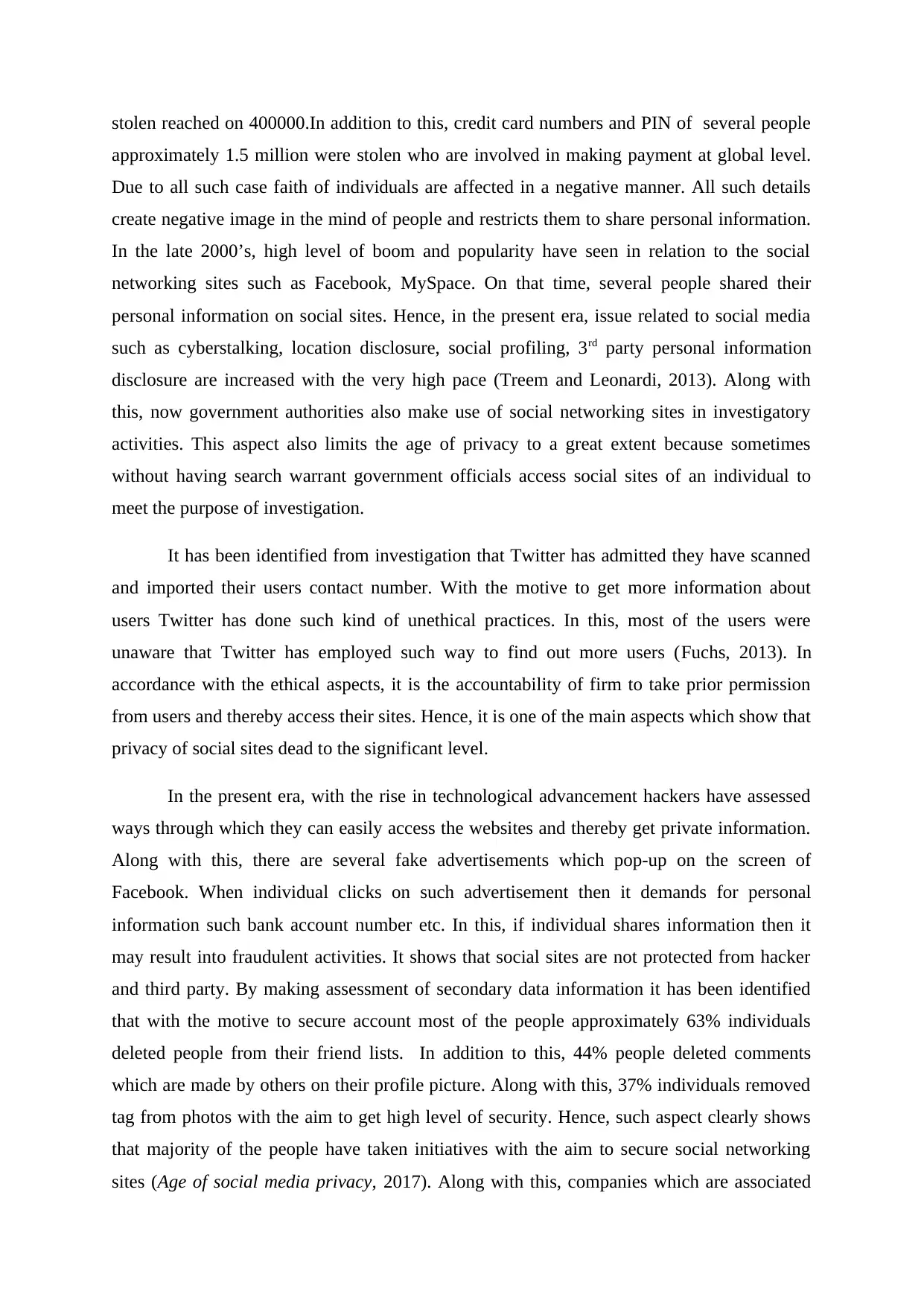
stolen reached on 400000.In addition to this, credit card numbers and PIN of several people
approximately 1.5 million were stolen who are involved in making payment at global level.
Due to all such case faith of individuals are affected in a negative manner. All such details
create negative image in the mind of people and restricts them to share personal information.
In the late 2000’s, high level of boom and popularity have seen in relation to the social
networking sites such as Facebook, MySpace. On that time, several people shared their
personal information on social sites. Hence, in the present era, issue related to social media
such as cyberstalking, location disclosure, social profiling, 3rd party personal information
disclosure are increased with the very high pace (Treem and Leonardi, 2013). Along with
this, now government authorities also make use of social networking sites in investigatory
activities. This aspect also limits the age of privacy to a great extent because sometimes
without having search warrant government officials access social sites of an individual to
meet the purpose of investigation.
It has been identified from investigation that Twitter has admitted they have scanned
and imported their users contact number. With the motive to get more information about
users Twitter has done such kind of unethical practices. In this, most of the users were
unaware that Twitter has employed such way to find out more users (Fuchs, 2013). In
accordance with the ethical aspects, it is the accountability of firm to take prior permission
from users and thereby access their sites. Hence, it is one of the main aspects which show that
privacy of social sites dead to the significant level.
In the present era, with the rise in technological advancement hackers have assessed
ways through which they can easily access the websites and thereby get private information.
Along with this, there are several fake advertisements which pop-up on the screen of
Facebook. When individual clicks on such advertisement then it demands for personal
information such bank account number etc. In this, if individual shares information then it
may result into fraudulent activities. It shows that social sites are not protected from hacker
and third party. By making assessment of secondary data information it has been identified
that with the motive to secure account most of the people approximately 63% individuals
deleted people from their friend lists. In addition to this, 44% people deleted comments
which are made by others on their profile picture. Along with this, 37% individuals removed
tag from photos with the aim to get high level of security. Hence, such aspect clearly shows
that majority of the people have taken initiatives with the aim to secure social networking
sites (Age of social media privacy, 2017). Along with this, companies which are associated
approximately 1.5 million were stolen who are involved in making payment at global level.
Due to all such case faith of individuals are affected in a negative manner. All such details
create negative image in the mind of people and restricts them to share personal information.
In the late 2000’s, high level of boom and popularity have seen in relation to the social
networking sites such as Facebook, MySpace. On that time, several people shared their
personal information on social sites. Hence, in the present era, issue related to social media
such as cyberstalking, location disclosure, social profiling, 3rd party personal information
disclosure are increased with the very high pace (Treem and Leonardi, 2013). Along with
this, now government authorities also make use of social networking sites in investigatory
activities. This aspect also limits the age of privacy to a great extent because sometimes
without having search warrant government officials access social sites of an individual to
meet the purpose of investigation.
It has been identified from investigation that Twitter has admitted they have scanned
and imported their users contact number. With the motive to get more information about
users Twitter has done such kind of unethical practices. In this, most of the users were
unaware that Twitter has employed such way to find out more users (Fuchs, 2013). In
accordance with the ethical aspects, it is the accountability of firm to take prior permission
from users and thereby access their sites. Hence, it is one of the main aspects which show that
privacy of social sites dead to the significant level.
In the present era, with the rise in technological advancement hackers have assessed
ways through which they can easily access the websites and thereby get private information.
Along with this, there are several fake advertisements which pop-up on the screen of
Facebook. When individual clicks on such advertisement then it demands for personal
information such bank account number etc. In this, if individual shares information then it
may result into fraudulent activities. It shows that social sites are not protected from hacker
and third party. By making assessment of secondary data information it has been identified
that with the motive to secure account most of the people approximately 63% individuals
deleted people from their friend lists. In addition to this, 44% people deleted comments
which are made by others on their profile picture. Along with this, 37% individuals removed
tag from photos with the aim to get high level of security. Hence, such aspect clearly shows
that majority of the people have taken initiatives with the aim to secure social networking
sites (Age of social media privacy, 2017). Along with this, companies which are associated
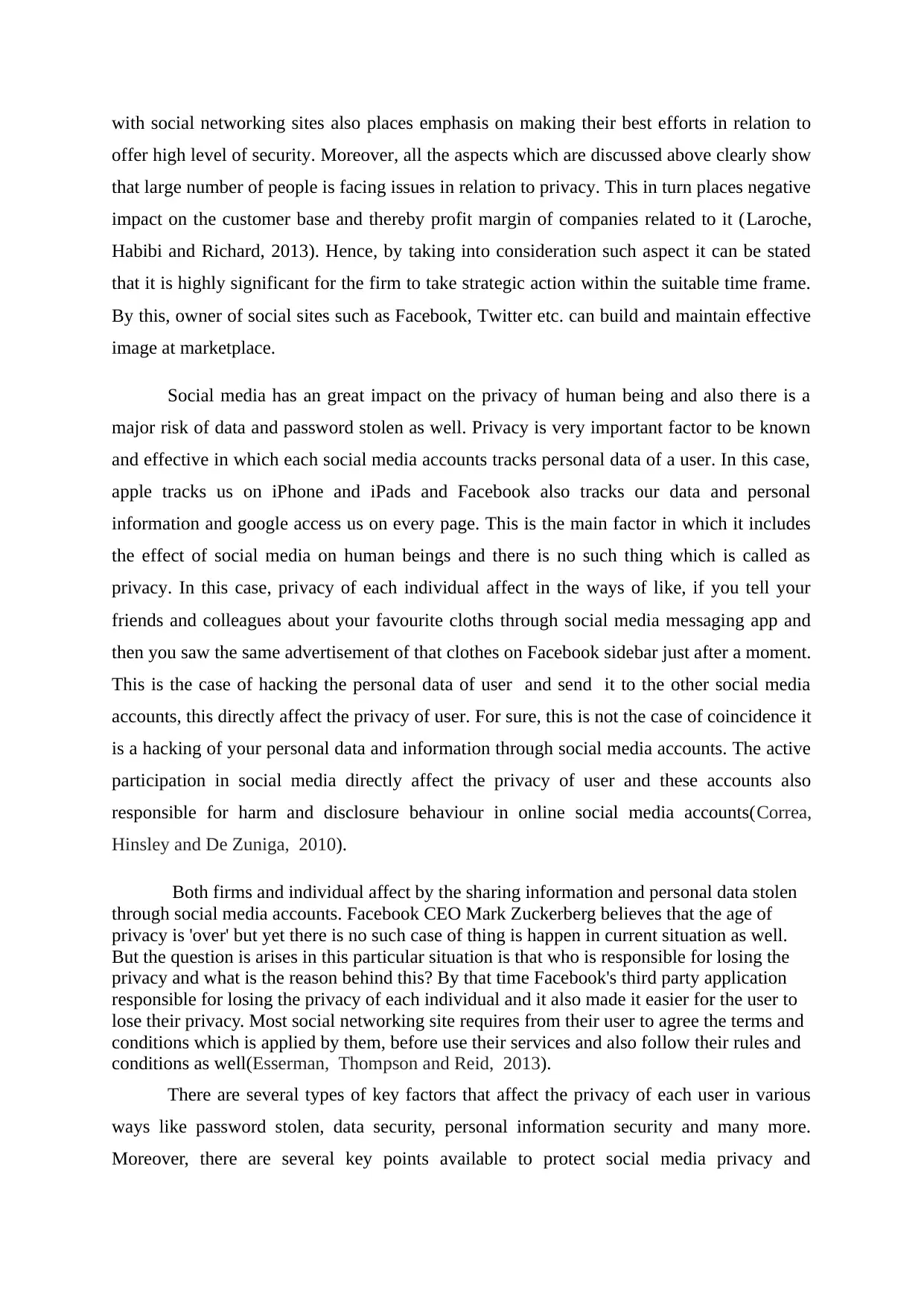
with social networking sites also places emphasis on making their best efforts in relation to
offer high level of security. Moreover, all the aspects which are discussed above clearly show
that large number of people is facing issues in relation to privacy. This in turn places negative
impact on the customer base and thereby profit margin of companies related to it (Laroche,
Habibi and Richard, 2013). Hence, by taking into consideration such aspect it can be stated
that it is highly significant for the firm to take strategic action within the suitable time frame.
By this, owner of social sites such as Facebook, Twitter etc. can build and maintain effective
image at marketplace.
Social media has an great impact on the privacy of human being and also there is a
major risk of data and password stolen as well. Privacy is very important factor to be known
and effective in which each social media accounts tracks personal data of a user. In this case,
apple tracks us on iPhone and iPads and Facebook also tracks our data and personal
information and google access us on every page. This is the main factor in which it includes
the effect of social media on human beings and there is no such thing which is called as
privacy. In this case, privacy of each individual affect in the ways of like, if you tell your
friends and colleagues about your favourite cloths through social media messaging app and
then you saw the same advertisement of that clothes on Facebook sidebar just after a moment.
This is the case of hacking the personal data of user and send it to the other social media
accounts, this directly affect the privacy of user. For sure, this is not the case of coincidence it
is a hacking of your personal data and information through social media accounts. The active
participation in social media directly affect the privacy of user and these accounts also
responsible for harm and disclosure behaviour in online social media accounts(Correa,
Hinsley and De Zuniga, 2010).
Both firms and individual affect by the sharing information and personal data stolen
through social media accounts. Facebook CEO Mark Zuckerberg believes that the age of
privacy is 'over' but yet there is no such case of thing is happen in current situation as well.
But the question is arises in this particular situation is that who is responsible for losing the
privacy and what is the reason behind this? By that time Facebook's third party application
responsible for losing the privacy of each individual and it also made it easier for the user to
lose their privacy. Most social networking site requires from their user to agree the terms and
conditions which is applied by them, before use their services and also follow their rules and
conditions as well(Esserman, Thompson and Reid, 2013).
There are several types of key factors that affect the privacy of each user in various
ways like password stolen, data security, personal information security and many more.
Moreover, there are several key points available to protect social media privacy and
offer high level of security. Moreover, all the aspects which are discussed above clearly show
that large number of people is facing issues in relation to privacy. This in turn places negative
impact on the customer base and thereby profit margin of companies related to it (Laroche,
Habibi and Richard, 2013). Hence, by taking into consideration such aspect it can be stated
that it is highly significant for the firm to take strategic action within the suitable time frame.
By this, owner of social sites such as Facebook, Twitter etc. can build and maintain effective
image at marketplace.
Social media has an great impact on the privacy of human being and also there is a
major risk of data and password stolen as well. Privacy is very important factor to be known
and effective in which each social media accounts tracks personal data of a user. In this case,
apple tracks us on iPhone and iPads and Facebook also tracks our data and personal
information and google access us on every page. This is the main factor in which it includes
the effect of social media on human beings and there is no such thing which is called as
privacy. In this case, privacy of each individual affect in the ways of like, if you tell your
friends and colleagues about your favourite cloths through social media messaging app and
then you saw the same advertisement of that clothes on Facebook sidebar just after a moment.
This is the case of hacking the personal data of user and send it to the other social media
accounts, this directly affect the privacy of user. For sure, this is not the case of coincidence it
is a hacking of your personal data and information through social media accounts. The active
participation in social media directly affect the privacy of user and these accounts also
responsible for harm and disclosure behaviour in online social media accounts(Correa,
Hinsley and De Zuniga, 2010).
Both firms and individual affect by the sharing information and personal data stolen
through social media accounts. Facebook CEO Mark Zuckerberg believes that the age of
privacy is 'over' but yet there is no such case of thing is happen in current situation as well.
But the question is arises in this particular situation is that who is responsible for losing the
privacy and what is the reason behind this? By that time Facebook's third party application
responsible for losing the privacy of each individual and it also made it easier for the user to
lose their privacy. Most social networking site requires from their user to agree the terms and
conditions which is applied by them, before use their services and also follow their rules and
conditions as well(Esserman, Thompson and Reid, 2013).
There are several types of key factors that affect the privacy of each user in various
ways like password stolen, data security, personal information security and many more.
Moreover, there are several key points available to protect social media privacy and
⊘ This is a preview!⊘
Do you want full access?
Subscribe today to unlock all pages.

Trusted by 1+ million students worldwide
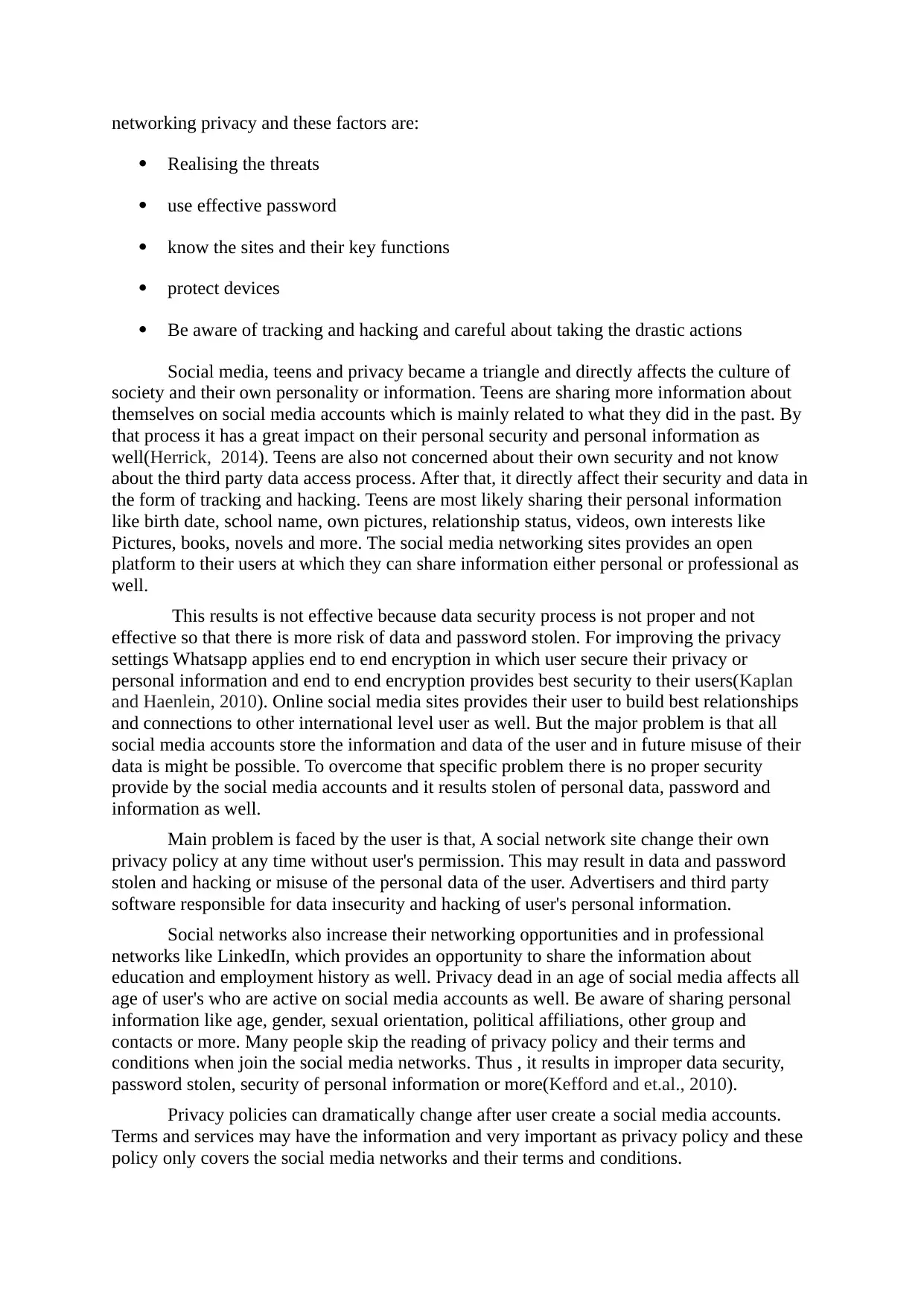
networking privacy and these factors are:
Realising the threats
use effective password
know the sites and their key functions
protect devices
Be aware of tracking and hacking and careful about taking the drastic actions
Social media, teens and privacy became a triangle and directly affects the culture of
society and their own personality or information. Teens are sharing more information about
themselves on social media accounts which is mainly related to what they did in the past. By
that process it has a great impact on their personal security and personal information as
well(Herrick, 2014). Teens are also not concerned about their own security and not know
about the third party data access process. After that, it directly affect their security and data in
the form of tracking and hacking. Teens are most likely sharing their personal information
like birth date, school name, own pictures, relationship status, videos, own interests like
Pictures, books, novels and more. The social media networking sites provides an open
platform to their users at which they can share information either personal or professional as
well.
This results is not effective because data security process is not proper and not
effective so that there is more risk of data and password stolen. For improving the privacy
settings Whatsapp applies end to end encryption in which user secure their privacy or
personal information and end to end encryption provides best security to their users(Kaplan
and Haenlein, 2010). Online social media sites provides their user to build best relationships
and connections to other international level user as well. But the major problem is that all
social media accounts store the information and data of the user and in future misuse of their
data is might be possible. To overcome that specific problem there is no proper security
provide by the social media accounts and it results stolen of personal data, password and
information as well.
Main problem is faced by the user is that, A social network site change their own
privacy policy at any time without user's permission. This may result in data and password
stolen and hacking or misuse of the personal data of the user. Advertisers and third party
software responsible for data insecurity and hacking of user's personal information.
Social networks also increase their networking opportunities and in professional
networks like LinkedIn, which provides an opportunity to share the information about
education and employment history as well. Privacy dead in an age of social media affects all
age of user's who are active on social media accounts as well. Be aware of sharing personal
information like age, gender, sexual orientation, political affiliations, other group and
contacts or more. Many people skip the reading of privacy policy and their terms and
conditions when join the social media networks. Thus , it results in improper data security,
password stolen, security of personal information or more(Kefford and et.al., 2010).
Privacy policies can dramatically change after user create a social media accounts.
Terms and services may have the information and very important as privacy policy and these
policy only covers the social media networks and their terms and conditions.
Realising the threats
use effective password
know the sites and their key functions
protect devices
Be aware of tracking and hacking and careful about taking the drastic actions
Social media, teens and privacy became a triangle and directly affects the culture of
society and their own personality or information. Teens are sharing more information about
themselves on social media accounts which is mainly related to what they did in the past. By
that process it has a great impact on their personal security and personal information as
well(Herrick, 2014). Teens are also not concerned about their own security and not know
about the third party data access process. After that, it directly affect their security and data in
the form of tracking and hacking. Teens are most likely sharing their personal information
like birth date, school name, own pictures, relationship status, videos, own interests like
Pictures, books, novels and more. The social media networking sites provides an open
platform to their users at which they can share information either personal or professional as
well.
This results is not effective because data security process is not proper and not
effective so that there is more risk of data and password stolen. For improving the privacy
settings Whatsapp applies end to end encryption in which user secure their privacy or
personal information and end to end encryption provides best security to their users(Kaplan
and Haenlein, 2010). Online social media sites provides their user to build best relationships
and connections to other international level user as well. But the major problem is that all
social media accounts store the information and data of the user and in future misuse of their
data is might be possible. To overcome that specific problem there is no proper security
provide by the social media accounts and it results stolen of personal data, password and
information as well.
Main problem is faced by the user is that, A social network site change their own
privacy policy at any time without user's permission. This may result in data and password
stolen and hacking or misuse of the personal data of the user. Advertisers and third party
software responsible for data insecurity and hacking of user's personal information.
Social networks also increase their networking opportunities and in professional
networks like LinkedIn, which provides an opportunity to share the information about
education and employment history as well. Privacy dead in an age of social media affects all
age of user's who are active on social media accounts as well. Be aware of sharing personal
information like age, gender, sexual orientation, political affiliations, other group and
contacts or more. Many people skip the reading of privacy policy and their terms and
conditions when join the social media networks. Thus , it results in improper data security,
password stolen, security of personal information or more(Kefford and et.al., 2010).
Privacy policies can dramatically change after user create a social media accounts.
Terms and services may have the information and very important as privacy policy and these
policy only covers the social media networks and their terms and conditions.
Paraphrase This Document
Need a fresh take? Get an instant paraphrase of this document with our AI Paraphraser

As per the above discussion on summarizing this essay, it directly affect the personal
security of data and information as well. Privacy dead in age of social media majorly affect
the personal information of user and indirectly responsible of harassment and other
advances(Michaelidou, Siamagka and Christodoulides, 2011). This results in negative
behaviour such as aggressive attitudes, improper behaviour with other persons or more
factors. But now onwards social networks become a major part of human life and indirectly
plays a vital role in international connection and sharing information and data as well. Social
networking sites has to be focuses on increasing the security and limit the privacy policy or
well concerned about the government rules and regulations as well(O'Keeffe and Clarke-
Pearson, 2011).
security of data and information as well. Privacy dead in age of social media majorly affect
the personal information of user and indirectly responsible of harassment and other
advances(Michaelidou, Siamagka and Christodoulides, 2011). This results in negative
behaviour such as aggressive attitudes, improper behaviour with other persons or more
factors. But now onwards social networks become a major part of human life and indirectly
plays a vital role in international connection and sharing information and data as well. Social
networking sites has to be focuses on increasing the security and limit the privacy policy or
well concerned about the government rules and regulations as well(O'Keeffe and Clarke-
Pearson, 2011).
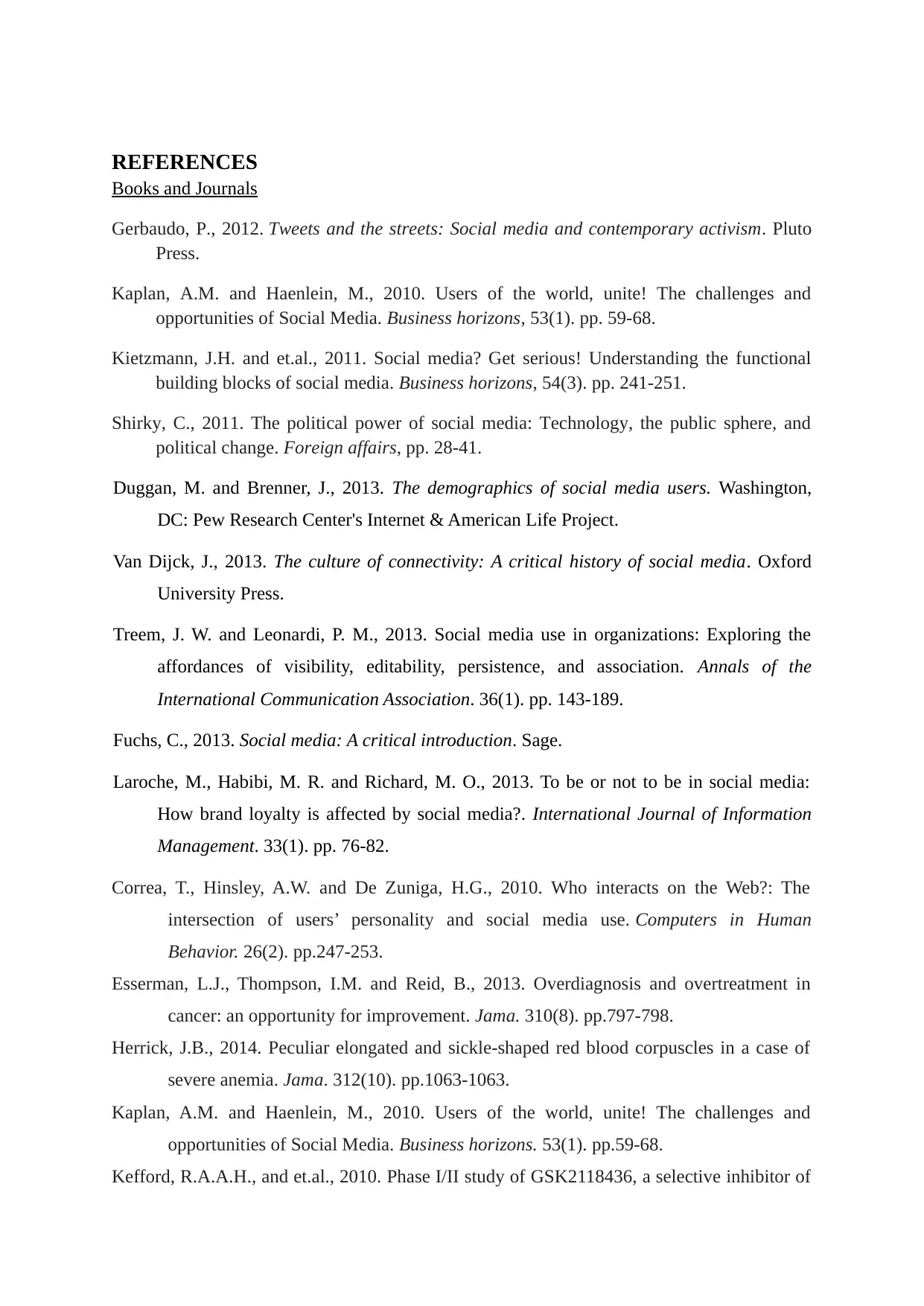
REFERENCES
Books and Journals
Gerbaudo, P., 2012. Tweets and the streets: Social media and contemporary activism. Pluto
Press.
Kaplan, A.M. and Haenlein, M., 2010. Users of the world, unite! The challenges and
opportunities of Social Media. Business horizons, 53(1). pp. 59-68.
Kietzmann, J.H. and et.al., 2011. Social media? Get serious! Understanding the functional
building blocks of social media. Business horizons, 54(3). pp. 241-251.
Shirky, C., 2011. The political power of social media: Technology, the public sphere, and
political change. Foreign affairs, pp. 28-41.
Duggan, M. and Brenner, J., 2013. The demographics of social media users. Washington,
DC: Pew Research Center's Internet & American Life Project.
Van Dijck, J., 2013. The culture of connectivity: A critical history of social media. Oxford
University Press.
Treem, J. W. and Leonardi, P. M., 2013. Social media use in organizations: Exploring the
affordances of visibility, editability, persistence, and association. Annals of the
International Communication Association. 36(1). pp. 143-189.
Fuchs, C., 2013. Social media: A critical introduction. Sage.
Laroche, M., Habibi, M. R. and Richard, M. O., 2013. To be or not to be in social media:
How brand loyalty is affected by social media?. International Journal of Information
Management. 33(1). pp. 76-82.
Correa, T., Hinsley, A.W. and De Zuniga, H.G., 2010. Who interacts on the Web?: The
intersection of users’ personality and social media use. Computers in Human
Behavior. 26(2). pp.247-253.
Esserman, L.J., Thompson, I.M. and Reid, B., 2013. Overdiagnosis and overtreatment in
cancer: an opportunity for improvement. Jama. 310(8). pp.797-798.
Herrick, J.B., 2014. Peculiar elongated and sickle-shaped red blood corpuscles in a case of
severe anemia. Jama. 312(10). pp.1063-1063.
Kaplan, A.M. and Haenlein, M., 2010. Users of the world, unite! The challenges and
opportunities of Social Media. Business horizons. 53(1). pp.59-68.
Kefford, R.A.A.H., and et.al., 2010. Phase I/II study of GSK2118436, a selective inhibitor of
Books and Journals
Gerbaudo, P., 2012. Tweets and the streets: Social media and contemporary activism. Pluto
Press.
Kaplan, A.M. and Haenlein, M., 2010. Users of the world, unite! The challenges and
opportunities of Social Media. Business horizons, 53(1). pp. 59-68.
Kietzmann, J.H. and et.al., 2011. Social media? Get serious! Understanding the functional
building blocks of social media. Business horizons, 54(3). pp. 241-251.
Shirky, C., 2011. The political power of social media: Technology, the public sphere, and
political change. Foreign affairs, pp. 28-41.
Duggan, M. and Brenner, J., 2013. The demographics of social media users. Washington,
DC: Pew Research Center's Internet & American Life Project.
Van Dijck, J., 2013. The culture of connectivity: A critical history of social media. Oxford
University Press.
Treem, J. W. and Leonardi, P. M., 2013. Social media use in organizations: Exploring the
affordances of visibility, editability, persistence, and association. Annals of the
International Communication Association. 36(1). pp. 143-189.
Fuchs, C., 2013. Social media: A critical introduction. Sage.
Laroche, M., Habibi, M. R. and Richard, M. O., 2013. To be or not to be in social media:
How brand loyalty is affected by social media?. International Journal of Information
Management. 33(1). pp. 76-82.
Correa, T., Hinsley, A.W. and De Zuniga, H.G., 2010. Who interacts on the Web?: The
intersection of users’ personality and social media use. Computers in Human
Behavior. 26(2). pp.247-253.
Esserman, L.J., Thompson, I.M. and Reid, B., 2013. Overdiagnosis and overtreatment in
cancer: an opportunity for improvement. Jama. 310(8). pp.797-798.
Herrick, J.B., 2014. Peculiar elongated and sickle-shaped red blood corpuscles in a case of
severe anemia. Jama. 312(10). pp.1063-1063.
Kaplan, A.M. and Haenlein, M., 2010. Users of the world, unite! The challenges and
opportunities of Social Media. Business horizons. 53(1). pp.59-68.
Kefford, R.A.A.H., and et.al., 2010. Phase I/II study of GSK2118436, a selective inhibitor of
⊘ This is a preview!⊘
Do you want full access?
Subscribe today to unlock all pages.

Trusted by 1+ million students worldwide
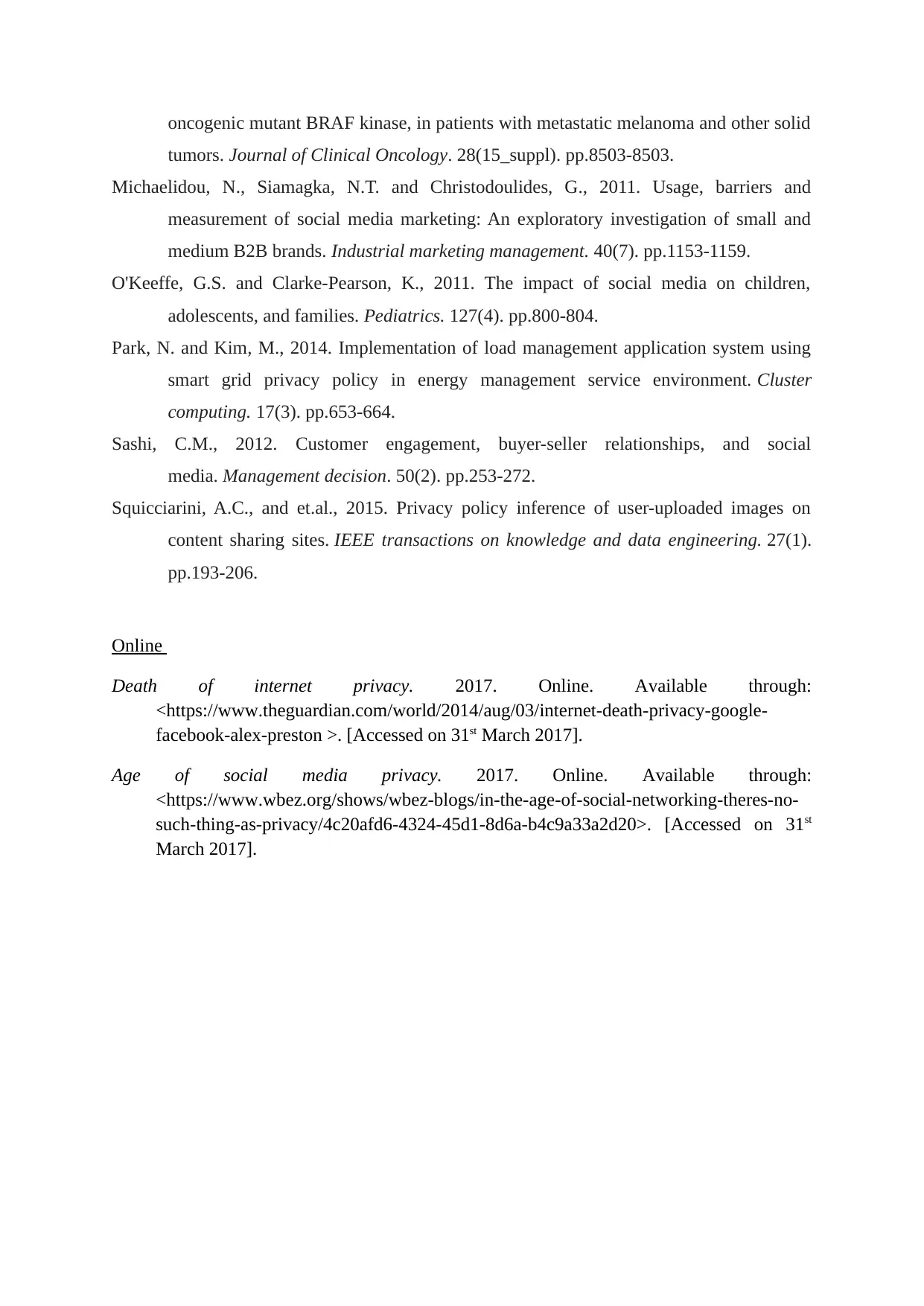
oncogenic mutant BRAF kinase, in patients with metastatic melanoma and other solid
tumors. Journal of Clinical Oncology. 28(15_suppl). pp.8503-8503.
Michaelidou, N., Siamagka, N.T. and Christodoulides, G., 2011. Usage, barriers and
measurement of social media marketing: An exploratory investigation of small and
medium B2B brands. Industrial marketing management. 40(7). pp.1153-1159.
O'Keeffe, G.S. and Clarke-Pearson, K., 2011. The impact of social media on children,
adolescents, and families. Pediatrics. 127(4). pp.800-804.
Park, N. and Kim, M., 2014. Implementation of load management application system using
smart grid privacy policy in energy management service environment. Cluster
computing. 17(3). pp.653-664.
Sashi, C.M., 2012. Customer engagement, buyer-seller relationships, and social
media. Management decision. 50(2). pp.253-272.
Squicciarini, A.C., and et.al., 2015. Privacy policy inference of user-uploaded images on
content sharing sites. IEEE transactions on knowledge and data engineering. 27(1).
pp.193-206.
Online
Death of internet privacy. 2017. Online. Available through:
<https://www.theguardian.com/world/2014/aug/03/internet-death-privacy-google-
facebook-alex-preston >. [Accessed on 31st March 2017].
Age of social media privacy. 2017. Online. Available through:
<https://www.wbez.org/shows/wbez-blogs/in-the-age-of-social-networking-theres-no-
such-thing-as-privacy/4c20afd6-4324-45d1-8d6a-b4c9a33a2d20>. [Accessed on 31st
March 2017].
tumors. Journal of Clinical Oncology. 28(15_suppl). pp.8503-8503.
Michaelidou, N., Siamagka, N.T. and Christodoulides, G., 2011. Usage, barriers and
measurement of social media marketing: An exploratory investigation of small and
medium B2B brands. Industrial marketing management. 40(7). pp.1153-1159.
O'Keeffe, G.S. and Clarke-Pearson, K., 2011. The impact of social media on children,
adolescents, and families. Pediatrics. 127(4). pp.800-804.
Park, N. and Kim, M., 2014. Implementation of load management application system using
smart grid privacy policy in energy management service environment. Cluster
computing. 17(3). pp.653-664.
Sashi, C.M., 2012. Customer engagement, buyer-seller relationships, and social
media. Management decision. 50(2). pp.253-272.
Squicciarini, A.C., and et.al., 2015. Privacy policy inference of user-uploaded images on
content sharing sites. IEEE transactions on knowledge and data engineering. 27(1).
pp.193-206.
Online
Death of internet privacy. 2017. Online. Available through:
<https://www.theguardian.com/world/2014/aug/03/internet-death-privacy-google-
facebook-alex-preston >. [Accessed on 31st March 2017].
Age of social media privacy. 2017. Online. Available through:
<https://www.wbez.org/shows/wbez-blogs/in-the-age-of-social-networking-theres-no-
such-thing-as-privacy/4c20afd6-4324-45d1-8d6a-b4c9a33a2d20>. [Accessed on 31st
March 2017].
1 out of 10
Related Documents
Your All-in-One AI-Powered Toolkit for Academic Success.
+13062052269
info@desklib.com
Available 24*7 on WhatsApp / Email
![[object Object]](/_next/static/media/star-bottom.7253800d.svg)
Unlock your academic potential
Copyright © 2020–2026 A2Z Services. All Rights Reserved. Developed and managed by ZUCOL.




